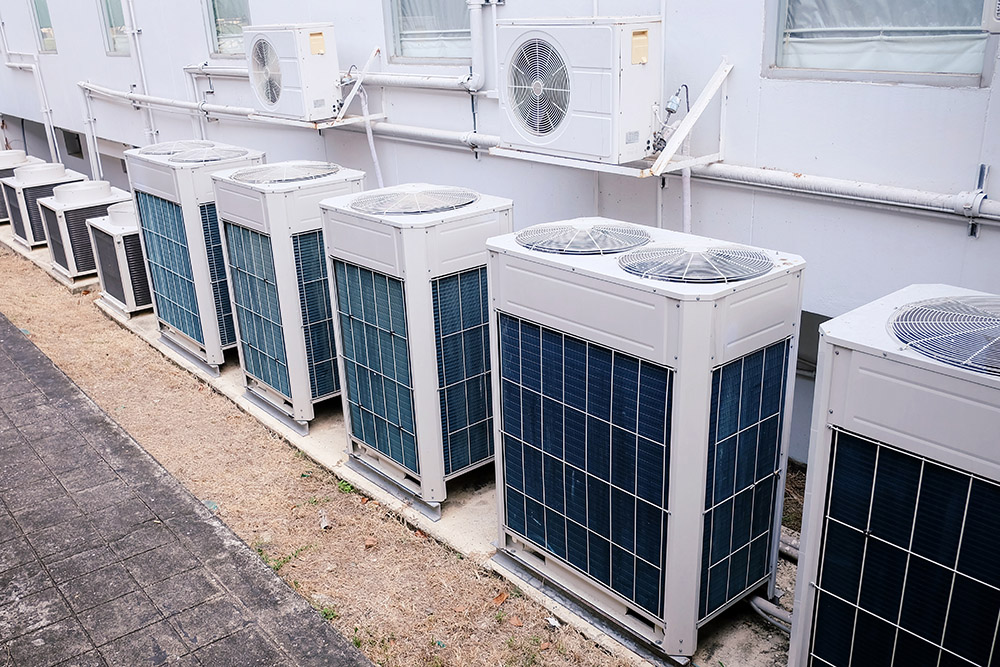One of the most challenging tasks is to find the best heating and cooling solution for your home or workplace. It is highly complicated as there are several factors to consider before making the final decision. The factors include your budget, age of the building, the size and partitioning of your home or workspace, and, the type of technology chosen. Honestly, there is hardly any unit that is perfectly suitable for every kind of space. For some spaces, the VRV system could be apt, whereas for other Split System. With this comes the comparison of VRV System vs Split System.
Generally, people are confused while choosing the apt systems between the VRV system and the Split units. Well, You must consider going through all the advantages and disadvantages of the particular systems according to your heating and cooling needs and then decide further.
VRV System vs Split System
VRV System
VRV (Variable Refrigerant Volume) is one of the well-known air-conditioning systems with an Inverter technology-based compressor developed by Daikin in 1982. These systems are for building applications and come with improved individual zone control, which helps in maintaining the climate of overall building efficiently.
With changing times, even VRV systems have been modernized for providing greater energy efficiency and acting as a comprehensive climate solution for various types of applications.VRV systems are considered to be the first ones with variable refrigerant flow control. Here, the system works on the heat pump and inverter technology for adjusting the refrigerant amount flowing through branch piping. It helps in saving on energy with precise control for supreme comfort.
Furthermore, These VRV systems come with several other features such as flexibility, waterless operation, and energy-saving. The recently launched VRV systems are designed to offer several benefits to the engineers, installers, and homeowners with the latest technology that enhances the building comfort.
Advantages of VRV System
Individual Control
VRV Systems have the ability to enable zones on the same or different floors for providing individual air conditioning control through refnet VRV. It automatically controls every unit for providing separate air conditioning to different sized rooms and maintains a suitable living or working environment.
Cost-Effective
Due to individual controls for each zone, VRV systems are quite lower on cost. When compared to other systems, VRV systems are the only ones with the ability to heat or cool specific spaces simultaneously. Here, the total load for a specific System can be altered based on the specific air-conditioning needs.
Energy -Efficient
VRV systems are capable enough to reuse heat from various rooms through the refrigerant pipe using heat recovery technology. They can reuse heat from places like the server and offices for providing heat to other areas, warm water, and heat applications according to your needs.
VRV systems have the potential to continuously adjust the temperature of refrigerant for matching the actual capacity and temperature required for increasing the seasonal efficiency. Opting for a more reliable compressor can make your VRV system intensify compression volume by 50%.
Furthermore, VRV systems provide enough space to use, are enhanced with the simple installation process, can be adopted for any floor plan, have a vast range of control system with low operating sound design, and have the auto-restart, auto swing function.
Split System
The split system are integrated with two operating components, such as a fan and an evaporator. Here, the system is fitted inside the building, whereas the compressor unit is situated outside the building. This system operates by taking out humidity and hot air from a building and eliminates it through a compressor. If you wish to heat your home, this system will pull out the cold air and provide warm air in the building.
A split system has an internal thermostat that recognizes warm air for activating the outdoor compressor. It circulates the refrigerant gas, which in result increases the temperature and pressure through the pipes to the condenser.
When in a condenser, the gas is converted into a chilled liquid that travels to the evaporator system. Further, the warm air passes through the pipe with chilled refrigerant for cooling before it goes back to the room through a fan system. The process goes on until the air is warmer than required.
Advantages of Split System
Lesser Energy Loss
When compared to other centralized air conditioning system, the split system doesn’t waste energy in the duct systems as they have two localized component sections. These sections lessen the chances of energy loss.
Selected heating and cooling
Opting for a split system will enable you to install an installer and a fan in each room. Furthermore, you can operate them individually by utilizing one outdoor compressor for suitable and effective heating.
Cost-Effective
Split system are considered to be one of the affordable and efficient techniques for controlling heat. Although these systems require electrical wiring and specialized installation techniques, they are easier to maintain and operate.
Air Purification
Some split system are capable of purifying the air and obstructing dust and allergens from entering the building.
Wrapping Up
While choosing between the VRV system vs Split system, always evaluate the suitability and efficacy of the system according to your cooling needs.
If you’re looking for a unit that provides you with the benefits of central air along with efficiency and customization of a space fan or heater, then you should opt for Split System. They have larger compressors when compared to window Systems, which enables them to cool larger areas.
And, If you’re looking for a single system that is a combination of heating, cooling, hot water, and ventilation, then you should opt for a VRV system. It can also be considered as an ultimate temperature control solution that is suitable for any building. Last but not least, it is highly energy-efficient, along with increased flexibility.
We hope this article on VRV System vs Split Units will help you in choosing the appropriate system for your home or workplace. Do you think we have missed any point? Feel free to share in the comments. Also, feel free to share your feedback and suggestions in the comments


